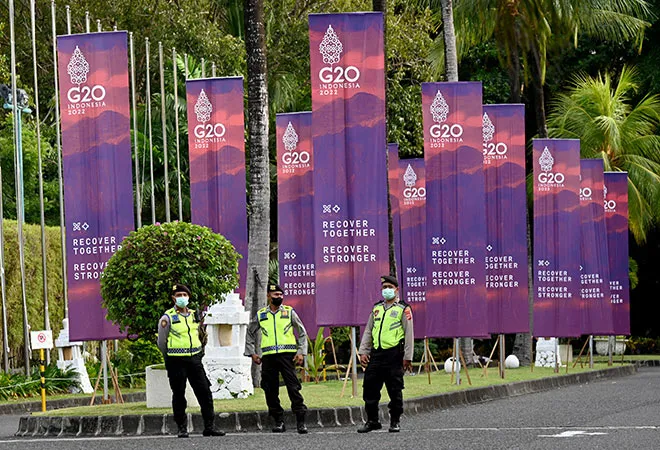-
CENTRES
Progammes & Centres
Location
The G20 is well-positioned to create frameworks for just transition that can provide common definitions, understanding and principles to aid international collaboration

Often, structural changes caused due to the transition to a low-carbon economy can pose several socio-economic challenges. Restructuring hard-to-abate sectors can result in the displacement of workers, loss of income, and marginalisation of regions. While transition pathways should continue to focus on emissions reduction, the social implications of decarbonisation cannot be ignored. The transition to a low-carbon economy, however, not only affects social parameters but can also lead to transition risks, which bring about economic changes such as disrupted supply or operation chains, civil unrest, reduced productivity, deterioration of financial institutions, and uneven market competitiveness. It is, therefore, crucial for transition finance to utilise a just transition lens to not only assess the socio-economic impact of climate transition but to also allow capital providers to navigate the transition challenge to mitigate the associated risks.
The transition to a low-carbon economy, however, not only affects social parameters but can also lead to transition risks, which bring about economic changes such as disrupted supply or operation chains, civil unrest, reduced productivity, deterioration of financial institutions, and uneven market competitiveness.
Under the Indonesian Presidency, the G20 leaders have recognised the importance of enabling “transition finance to support orderly, just and affordable transitions towards low-greenhouse gas emissions and climate-resilient economy”. Moreover, members of the G20 Sustainable Finance Working Group (SFWG) have recommended the development of a framework for transition finance. Consequently, an input paper has been presented by the International Labour Organisation (ILO) for the SFWG, which aims to address the role of financial systems in achieving a just transition.
The financial sector can play an important role in accelerating the transition through capital and risk-mitigating mechanisms. In recent years, ‘Transition Bonds’ have emerged as a new use-of-proceeds sustainable financing. According to Climate Bonds Initiative, till March 2021, 18 Transition Bonds were issued, including from energy company Snam, the European Bank of Reconstruction and Development, and the Bank of China, among others. However, transition bonds have faced flak from investors for lack of clear standards. Furthermore, negligible efforts have been made to integrate the just transition principles in the existing transition finance frameworks.
While efforts have been made towards the recognition of the social impact of climate transition, sustainable finance still largely focuses on the environmental pillar. Due to a lack of mutual understanding, standardisation and definitions, assessing the social aspect could prove to be difficult for capital providers. For instance, in the ESG analysis, most asset managers focus on the ‘E’ aspect while making their decisions—a BNP survey revealed that 51 percent of the respondents cited ‘social’ as the most challenging component to assess and incorporate into their investment analysis.
Due to a lack of mutual understanding, standardisation and definitions, assessing the social aspect could prove to be difficult for capital providers.
Several ecosystem actors—governments, central banks, international organisations, financial service providers, Multilateral Development Banks, international financial institutions, and private financial institutions—are important in ensuring that capital flows support a just transition approach. One way in which this can be addressed by Governments is through the issuance of sovereign bonds that are tied to just transition guidelines. According to Nick Robins, Professor at the Grantham Research Institute, sovereign transition bonds would be able to bring together the climate initiatives backed by green bonds with the social dimension of transition.
Just Transition Funds are another means of securing long-term finance required to meet the goal. The European Union, for instance, has initiated a Just Transition Fund from 2021-2027. The core purpose of the fund is to aid transition, reduce at least 55 percent of the emissions by 2030, and achieve climate neutrality by 2050. The fund not only aims to support economic diversification but also includes a social dimension of environmental rehabilitation, up- and-reskilling of workers, providing job assistance, and inclusive jobseekers’ programmes to ensure employee protection.
The G20 is well-positioned to create frameworks for just transition that can provide common definitions, understanding and principles to aid international collaboration.
The government, central banks, and regulators have a crucial role to play in ensuring that just transition in public finance strategies focuses on the social impact of the climate transition. The ILO, in its input paper, suggests redirection of revenues from carbon pricing and carbon markets to the funding of measures to ensure that social and employment impacts of decarbonisation are addressed. Other such measures include creating an enabling regulatory environment by promoting transparency for the socio-economic implications of climate transition strategies. This involves mandating appropriate disclosures, standards and accountability metrics for incorporating the social dimension for transition strategies.
Moreover, financial institutions can help in the identification and integration of the social dimension in key performance indicators for financial instruments such as transition bonds. MDBs’ support is critical in optimising development assistance towards supporting just transition and integrating the social aspects in the countries’ nationally determined contributions (NDCs). Towards this goal, the MDBs have already released the joint MDB Just Transition High-Level Principles, where they have recognised their potential for support of place-based planning, labour market and social development, SME and social finance, skilling and training.
The G20 is well-positioned to create frameworks for just transition that can provide common definitions, understanding and principles to aid international collaboration. G20’s SFWG plays a key role in addressing the information asymmetry and enabling knowledge networks to provide technical assistance, especially to emerging and developing economies. It is an opportune moment for India to further the work of the Indonesian presidency in ensuring that social dimensions are well integrated in the financing of a just transition.
The views expressed above belong to the author(s). ORF research and analyses now available on Telegram! Click here to access our curated content — blogs, longforms and interviews.

Shruti Jain was Coordinator for the Think20 India Secretariat and Associate Fellow Geoeconomics Programme at ORF. She holds a Masters degree in Public Policy and ...
Read More +